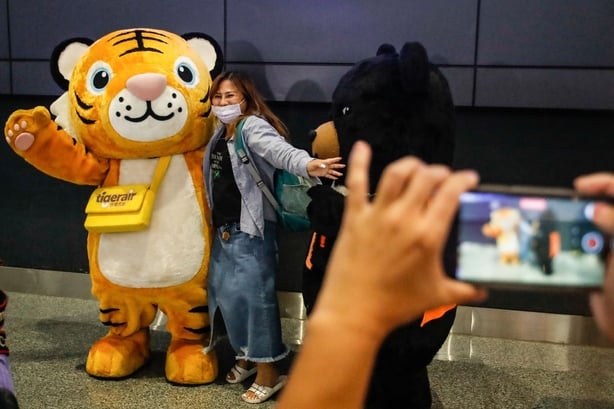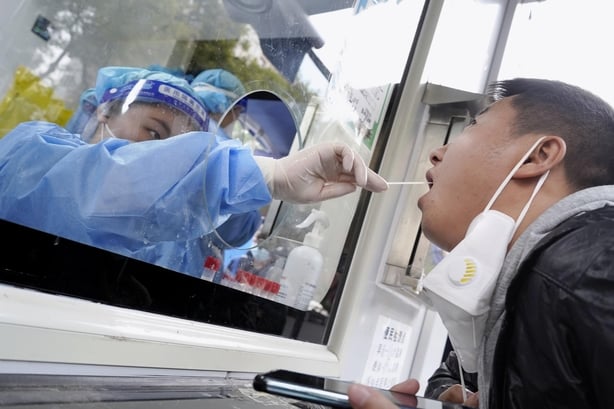Taiwan has welcomed its first batch of international tour groups after the island fully reopened its borders, ending strict quarantine rules in place since the coronavirus pandemic began.
A group of tourists from Thailand arrived shortly after midnight and were greeted at Taoyuan airport with flower garlands and an exuberant dancing bear mascot.
Valaisurang Bhaedhayajibh, 53, said she was visiting Taiwan the first time in 20 years and was accompanied by her daughter Sisiree.
"I heard about the lakes and all the nature, and also shopping. She's on her school break so I am bringing her over here," she told AFP.
"It's very convenient. We didn't have to do anything much, you know, in terms of preparation. But we got vaccinated and everything."
Pairry Kalong, another Thai tourist, said she planned to eat hot pot "first thing" as well as visit Ximending, Taipei's neon-lit shopping district.
Tanachot Jaiungwattana said he was last in Taiwan shortly before the pandemic sealed the borders.
"I miss here very much," he said. "I love the people and food."

Taiwan has won praise for how it handled the pandemic, although like nearby Japan and Hong Kong it has been very cautious in reopening.
As most countries vacillated on restricting travel at the start of the pandemic and saw deaths soar, Taiwan quickly shut its borders and stamped out the first wave.
It remained comparatively coronavirus-free at the expense of closed borders. Tourism industries suffered badly but the island's export-driven economy continued to grow.
Like Hong Kong and Japan, which also reopened to tourists recently, Taiwan is among the last places in the world to end mandatory quarantine.
Mainland China is the last remaining major economy that is still keeping its borders sealed.
Under Taiwan's current rules, three days of hotel quarantine have been replaced with seven days of "self-monitoring" where tourists are expected to keep an eye on their health and wear face masks indoors and outdoors.
The system will operate largely on trust, with tourists given coronavirus test kits on arrival to use throughout their stay.
That contrasts with Hong Kong where tourists must submit to regular tests for a week after their arrival and cannot enter bars and restaurants for the first three days.
China's zero-COVID policy seen lingering as cases double from Sept
China's daily count of new coronavirus cases has doubled since September, hardening the resolve of authorities to eliminate outbreaks as quickly as they appear and dimming hopes for an easing in their zero-Covid stance.
China reported 1,624 new Covid-19 infections for 12 October, of which 372 were symptomatic and 1,252 asymptomatic, the National Health Commission said.

That compares with 1,890 new cases a day earlier - 417 symptomatic and 1,473 asymptomatic infections, which China counts separately.
The caseloads were double those in the second half of September, when new cases trended around 900 a day.
China has been fighting a Covid rebound after the National Day "Golden Week" holiday earlier this month and just ahead of a key Party congress where Xi Jinping is expected to extend his leadership.
While the infection tally is small by global standards, China has insisted that its policies save lives.
People's Daily, the party's official newspaper, warned in commentaries for three straight days this week against any relaxation in China's policy of stamping out Covid flare-ups, despite the toll on the already limping economy and a stressed-out population.
"There is no prospect of China lifting its zero-Covid policy in the near future and it probably won't happen before the end of 2023," Capital Economics wrote.
"Another year of zero-Covid equals another year of depressed consumer activity and a high risk of recurrent large-scale lockdowns."
As of 12 October, mainland China had confirmed 254,855 cases with symptoms.
China's capital Beijing reported 12 local symptomatic cases and six asymptomatic cases, compared with 10 local symptomatic cases and one asymptomatic case the previous day, local government data showed.
Financial hub Shanghai reported 44 local asymptomatic cases and three symptomatic cases, while Shenzhen reported 26 new locally transmitted Covid-19 infections.
There were no new deaths, same as a day earlier, keeping the nation's fatalities at 5,226

